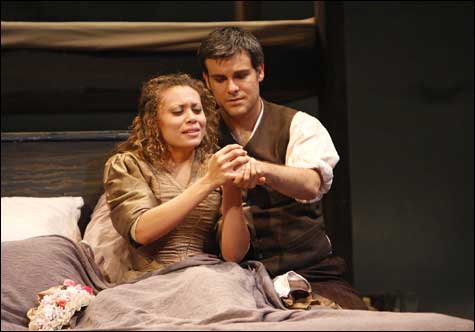
LA BOHÈME: Nothing bad, but nothing you haven’t seen before either. |
At Boston Lyric Opera’s revival of La bohème (an economically driven 2002 co-production with Opera Theatre of St. Louis, with costumes designed for the Santa Fe Opera), I ran into several acquaintances who had never seen Puccini’s most popular opera, his Romeo and Juliet — which, as in Shakespeare, is a lively comedy about young love with a heartrending tragic ending. (It’s now also famous as the basis for the Broadway musical Rent.) My friends were enjoying the sweet story and the endless flow of melody. And unlike BLO’s very first Bohème, back in 1992 (the only Bohème I’ve ever seen in which the staging undermined the foolproof tearjerking dénouement), this production (remaining performances at the Shubert Theatre November 9, 11, and 13) does nothing — or nothing major — wrong. I was a little worried early on when the poet Rodolfo (tenor Derek Taylor) sings about looking out over the smoking chimneys of Paris while he’s standing nowhere near the garret window Puccini’s librettist surely had in mind. And in the last act, stage director Timothy Ocel has one of Rodolfo’s roommates, the philosopher Colline (long-haired bass-baritone Matthew Burns), relieve his bladder without leaving the room. Ocel seems surprisingly unsure of the layout of that garret, or else he has a rather odd notion about roommates. But my worst fears remained groundless.
With good singing, acting, and conducting, a stage director for La bohème can afford to keep out of the way, which is pretty much what Ocel does. No awful gimmicks, and nothing more than routine, either. If you’ve seen La bohème, there’s little here you haven’t seen. First-time BLO conductor Ari Pelto keeps up a lively pace, and the orchestra plays extremely well for him. And the cast consists of attractive young prize winners, most of them making their BLO debuts.
For La bohème veterans, however, there’s a good deal to be desired. None of the singers here (and the same was true of the 2002 BLO production) compares with the wonderful baritone Mark Oswald as the incessantly jealous painter Marcello (another roommate), or irresistible Angelina Réaux as his maddeningly coquettish girlfriend, Musetta, who towered above that misconceived 1992 version. By far the best singing this time is by soprano Alyson Cambridge as Mimi. Her warm, full voice seems even a little too mature and healthy for a 22-year-old tubercular seamstress; she sounds more like a Butterfly or a Tosca, weightier roles. Here Mimi’s voice is so much bigger than Rodolfo’s (and Cambridge rarely modulates her dynamics to blend better with the other singers), she had me wondering which of the two lovers really had TB. She also “acts.” Everything seems practiced, and exaggerated: the coyness (more Butterfly than Mimi), the fragility, the coughs, the falling to her knees, the fainting. There’s too much artifice at the core of Cambridge’s conception for Mimi’s innate sincerity. Her death scene certainly had the tears flowing (thank you, Puccini), but I hope more performing experience will teach her to be a more cooperative ensemble singer and a more inward actress. She’s got what it takes; she just needs to learn to make better use of it.